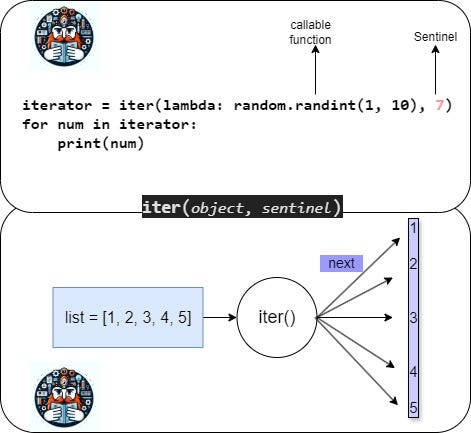Exploring Iterators in python : iter(object)
After reading this you should be able to take your code from this:
blocks = []
while True:
block = f.read(32)
if block == '':
break
blocks.append(block)to this
from functools import partial
blocks = []
for block in iter( partial(f.read, 32), '')):
blocks.append(block)enter python iterators
iter(object, sentinel)
The iter() function creates an iterator from an object. Without a second argument, it requires an iterable (supporting __iter__() or __getitem__()).
If a sentinel value is provided, iter() repeatedly calls a given callable until the sentinel value is returned, raising StopIteration when encountered.
By default list, tuples and dictionary are iterable i.e they all has __iter__() method implicitly.
a = [10, 20, 30, 40]
# Convert the list into an iterator
iterator = iter(a) # same as a.__iter__()
# Access elements using next() : Both are equaly same
print(next(iterator)) # 10
print(a.__next__()) # 20
More examples
# With a string
s = "Python"
iterator = iter(s)
print(next(iterator))
print(next(iterator))
# Even Dictionary
d = {'a': 1, 'b': 2, 'c': 3}
iterator = iter(d)
for key in iterator:
print(key)
With ‘sentinel’ value provided you can call any object as long as they meet the condition
# Generate numbers until sentinel value is encountered
import random
# Keep printing random numbers until it encounter '7'
# if it meet '7' it'll stop
iterator = iter(lambda: random.randint(1, 10), 7)
for num in iterator:
print(num)
great example showing this:
from functools import partial
# Keep printing file in chunk of 64 byte and if it encounter an empty read, then stop.
with open('mydata.db', 'rb') as f:
for block in iter(partial(f.read, 64), b''):
process_block(block)Building Custom Iterators
Building an iterator from scratch is easy in Python. We just have to implement the __iter__() and the __next__() methods,
__iter__()returns the iterator object itself. If required, some initialization can be performed.
__next__()must return the next item in the sequence. On reaching the end, and in subsequent calls, it must raiseStopIteration.
class Fibonacci:
"""Class to implement an iterator of Fibonacci numbers"""
def __init__(self, max):
self.max = max
def __iter__(self):
"" Use this to initialize variables ""
self.a = 0
self.b = 1
self.count = 0 # Keep track of how many numbers we've generated
return self
def __next__(self):
if self.count < self.max:
result = self.a
# Efficiently calculate the next Fibonacci number
self.a, self.b = self.b, self.a + self.b
self.count += 1
return result
else:
# This is where you stop iteration
raise StopIteration
Demonstrate various ways to use the Fibonacci iterable
Explicitly using iter() and next()
fib_sequence = Fibonacci(10) # Generate up to 10 Fibonacci numbers my_iterator = iter(fib_sequence) print("Using next() explicitly:") for _ in range(5): # Print first 5 print(next(my_iterator))Using in a for loop (implicit iteration)
fib_sequence = Fibonacci(7) # Generate up to 7 Fibonacci numbers print("\nUsing in a for loop:") for num in fib_sequence: print(num)Converting to a list
fib_sequence = Fibonacci(15) # Generate up to 15 Fibonacci numbers fib_list = list(fib_sequence) # Consumes the iterator and creates a list print("\nConverting to a list:") print(fib_list)Slicing an iterator (requires itertools)
import itertools fib_sequence = Fibonacci(20) sliced_fib = itertools.islice(fib_sequence, 5, 10) # Get elements from index 5 up to (but not including) 10 print("\nSlicing the iterator:") for num in sliced_fib: print(num)Using with the * operator for unpacking (after converting to a list)
fib_sequence = Fibonacci(8) fib_list = list(fib_sequence) print("\nUnpacking with *:") print(*fib_list)
Lastly, demonstrating the power of iterables: Memory efficiency
large_fib_sequence = Fibonacci(10**6) # Imagine a very large sequence
# We don't have to store all the numbers in memory at once!
for i, num in enumerate(large_fib_sequence):
if i < 10: # Print the first 10
print(num)
if i > 1000: # Stop after a while to avoid printing too much
break
# The large_fib_sequence iterable only generates numbers as needed.


